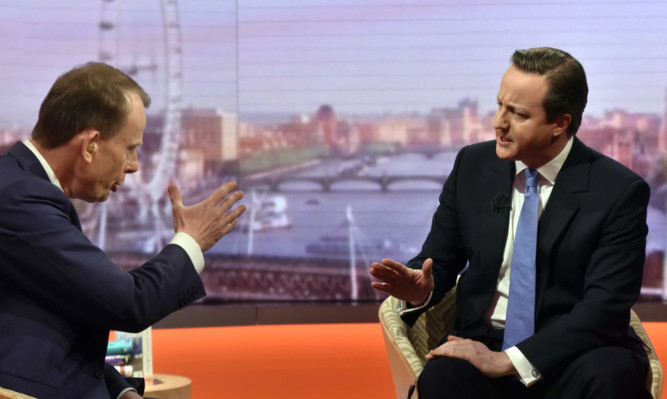David Cameron has renewed warnings of the “frightening prospect” of a Labour government relying on SNP votes.
Despite opinion polls remaining deadlocked, the Prime Minister insisted an outright Tory majority was “within reach” and said he would be getting “out on the streets” to press home his message in the run-up to May 7.
In an often-tetchy appearance on BBC1’s Andrew Marr Show he declined to rule out any post-election deal with Ukip if there was a hung parliament and said flagging poll support suggested the eurosceptic party “will be lucky if they have even one seat”.
He seized on comments by SNP leader Nicola Sturgeon that her party – which appears on course to snatch dozens of seats from Labour and to become the third-biggest in the Commons – would seek to “change the direction” of a Labour administration.
Ms Sturgeon – who is urging Labour leader Ed Miliband to join a “progressive” alliance with parties opposed to austerity – told the programme that fixed-term parliaments make it “possible to change the direction of a government on individual issues without bringing that government down”.
But Mr Cameron said it was a recipe for other parts of the UK losing out.
“The facts of this election is that there is only one party that can achieve that overall majority and continue with the plan that is working … and that is the Conservative Party,” he said, denying that private party polling showed it was unlikely.
“The fact of this election is that Labour is facing wipe-out in Scotland … and Nicola Sturgeon is saying that she would want to alter the course and the direction of the government vote by vote.
“This would be the first time in our history that a group of nationalists from one part of our country would be involved in altering the direction of the government of our country.
“I think that is a frightening prospect for people thinking in their own constituencies: Is that bypass going to be built? Will my hospital get the money it needs?
“Frankly, this is a group of people that wouldn’t care what happened in the rest of the country. The rest of the United Kingdom – England, Wales, Northern Ireland – wouldn’t get a look-in.”
Shadow chancellor Ed Balls said there would be an “absolute 100% total firewall” between Labour and the Scottish nationalists in relation to the first Budget.
“As Ed Miliband said a couple of weeks ago, the first Budget will be written by Ed Miliband and me, not by Nicola Sturgeon or Nigel Farage or anyone else.
“That is what we are going to do. We have been very clear,” he told the Sky News Murnaghan programme.
They were the latest salvoes in a frantic hearts-and-minds battle for voters as the race for No 10 remains too close to call.
In a rare move, Mr Cameron used a Sunday Times article to issue a direct plea to Liberal Democrat and Ukip supporters to vote Tory to prevent a Labour-SNP government taking power.
Mr Miliband appealed to moderate “one nation” Tories to vote Labour, insisting that he now represented the centre ground and would keep Britain firmly in the heart of Europe
The latest polls continued to offer conflicting pictures, with an Opinium poll for The Observer giving the Tories a four-point lead over Labour, while YouGov for the Sunday Times put Labour three ahead.
“I want to reach out to Tory voters, to Liberal Democrat voters, to Ukip voters, to non-voters … to people who feel that David Cameron can’t answer the challenge of our time, who worry about our place in the European Union, who really think to themselves, ‘we can do a lot better as a country’,” Mr Miliband wrote in the Observer.
He described Mr Cameron as “ideologically beached” and with no answers about how to tackle inequality.
Liberal Democrat Cabinet minister Vince Cable dismissed Mr Cameron’s tactical voting call as “dangerous nonsense”.
He said there was no chance the Tories could win an overall majority and would end up reliant on the support of Ukip and “30 or 40 maverick Tory MPs”.
“These are people who hate his guts,” he told the Andrew Marr Show.
The Business Secretary insisted he had no personal preference over whether his party governed with the Conservatives or Labour in the event of another hung parliament.
Under the Lloyds plan, a proportion of the next tranche of the taxpayers’ stake in the bank to be sold will see a proportion of shares earmarked for small investors at a discount of at least 5%.
Buyers who keep them for a year will be rewarded with a “loyalty bonus” of one additional free share for every 10 they still hold.
After last week’s announcement by the Tories to revive Margaret Thatcher’s Right to Buy scheme, the move recalls another of her keynote policies to build a share-owning democracy.
